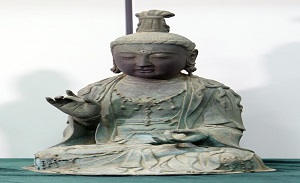The theft of a Buddhist statue reignites cultural tensions between Korea and Japan

Seoul (AsiaNews) - South Korea's Daejeon Court of Appeals has issued a ruling on the theft of a Buddhist statue that was produced in Korea but stolen in Japan, overturning an earlier verdict and underscoring how difficult relations between the two Asian neighbors can be. The distrust is mutual, feeding on an aversion and resentment that periodically resurface especially when it comes to issues of cultural identity such as the one the Daejeon court had to adjudicate.
The affair dates back to 2012, when South Korean thieves stole some works of great artistic value from the Kannon Buddhist temple, located on the Japanese island of Tsushima. Intending to resell them in Korea, they smuggled them back into the country, but police in Seoul managed to arrest them and confiscate the artifacts. While some of them were returned, the return of the statue of a Bodhisattva was blocked by the Buseok Temple, which claimed its original ownership.
The statue in fact dates back to 1330 and was produced by the South Korean temple itself, located in Seosan, about 100 kilometers southwest of Seoul. According to Buseok, the statue had been commandeered as loot by Japanese pirates who raided the coast of Korea until finally arriving at the Kannon temple in Tsushima during the first half of the 16th century.
In 2016, the South Korean Buddhist temple, supported by citizen collectives, had petitioned the Seoul government not to return the statue to Japanese authorities and instead acknowledge its ownership to the Buseok temple. The following year a district court had agreed with the South Korean temple, generating sparks between the two countries.
The Daejeon Court of Appeals in recent days, however, overturned the first instance ruling recognizing ownership to the South Korean temple. While pointing out that the statue most likely arrived in Japan illegally, the judges found that there is no concrete evidence that today's Buseok temple is also the one that originally owned the statue. The court also awarded ownership to the Kannon temple because for some 60 years, beginning in 1953, when the Japanese temple was legally registered, the statue remained on display 'openly and peacefully'-this would make the Japanese temple the rightful owner by usucaption.
In South Korea, where there is still strong anti-Japanese sentiment dating back to the days of colonization during the last century, public opinion is divided on whether to return the statue to Japan.
Buseok Temple's lawyer said an appeal will be filed, while the head of the South Korean Civil and Religious Committee for the return of the statue said that 'today's ruling is difficult to understand and lacks legal logic.' Sekko Tanaka, former abbot of the Japanese temple, on the other hand, said he was satisfied but expressed regret that what is essentially a simple case of theft has dragged on for more than a decade.
by Guido Alberto Casanova
https://www.asianews.it/news-en
